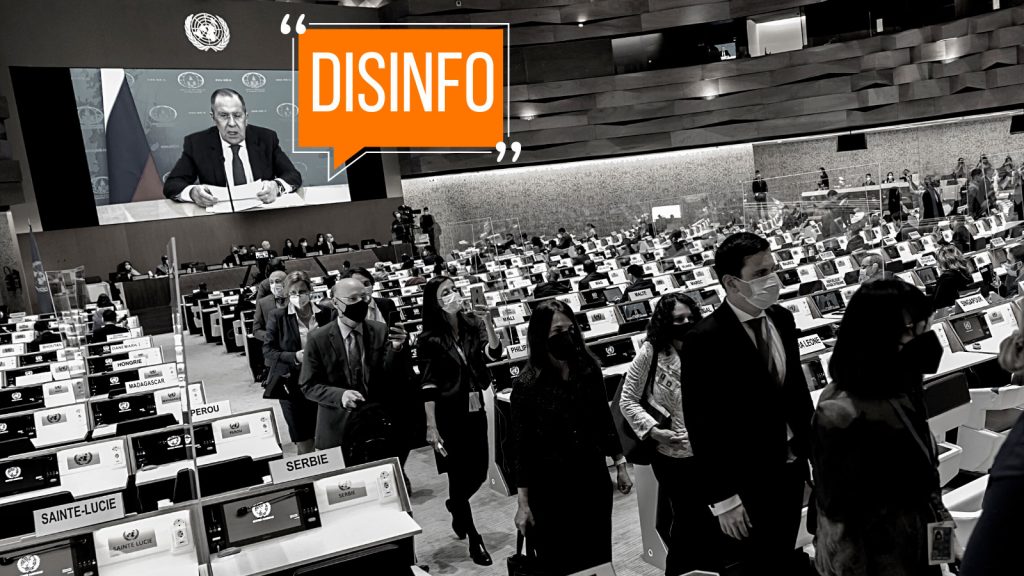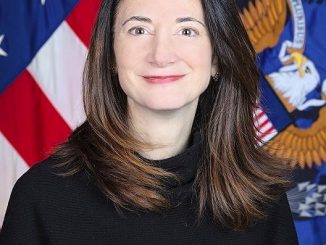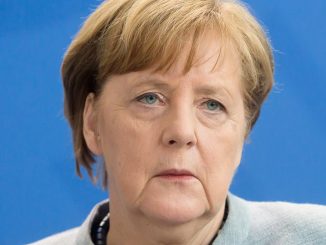On 1 March, Russian Foreign Minister Sergei Lavrov was set to address the Conference on Disarmament at the UN in Geneva… More significantly though, the Russian statement fell flat in the near-empty conference hall as the majority of diplomats had left the room to protest Russia’s aggression against a peaceful neighbour.
Source : EUVSDISINFO.eu – 3 March 2022.
On 1 March, Russian Foreign Minister Sergei Lavrov was set to address the Conference on Disarmament at the UN in Geneva. A routine duty for Russia’s top diplomat. Only this time, Mr Lavrov chose to deliver the statement through a pre-recorded video message, because following Russia’s unprovoked invasion of Ukraine on 24 February, most of Europe had closed its airspace to Russian aircraft, although the Swiss airspace remained open.

More significantly though, the Russian statement fell flat in the near-empty conference hall as the majority of diplomats had left the room to protest Russia’s aggression against a peaceful neighbour. Nobody can be expected to sit and idly listen to Russia actively spreading disinformation and falsehoods about its aggression against Ukraine.
As expected, Mr Lavrov promptly used the opportunity to deliver another dose of familiar Kremlin disinformation. While the circumstances of his address were unusual, the contents were not – a wide range of well-known Kremlin falsehoods about arms control, disarmament and non-proliferation.
Spiteful lies to justify illegal war
Mr Lavrov proceeded immediately to level a wide range of accusations against Ukraine, repeating the same lies that EUvsDisinfo had disproven and debunked before. Yet, the minister seemed to draw heavily on the type of Orwellian Newspeak that is increasingly used by the Kremlin.
Mr Lavrov also addressed the topic of the Conference on Disarmament – arms control, disarmament and non-proliferation. However, the statement was rich in disinformation, baseless accusations and thinly veiled threats. The minister issued entirely unsubstantiated claims that Ukraine intended to acquire nuclear weapons, even though Ukraine has never strayed from its commitments under the Budapest Memorandum(opens in a new tab). However, this disinformation narrative is a common one in the Kremlin’s attempt to justify the invasion of Ukraine.
The Foreign minister called on all states “to refuse to take any actions aimed at dismantling the arms control, non-proliferation and disarmament architecture”. A strange call, since Russia has been trying to dismantle the existing arms control architecture, as exemplified by the demise of the Intermediate-Range Nuclear Forces Treaty(opens in a new tab). However, this disinformation narrative fits neatly into one of the favourite pastimes of the Kremlin – blaming the West for all the world’s ills. Unsurprisingly, Mr Lavrov repeated all top five Russia’s myths about NATO(opens in a new tab).
Of course, Russian arms control experts know full well that the NATO nuclear sharing arrangement is fully in line with the Treaty on Non-Proliferation(opens in a new tab), but no Russian statement on the topic would be complete without making false claims that US nuclear weapons in Europe are threatening Russia.
Throw everything against the wall and see what sticks
Mr Lavrov also did not fail to play the “Russia is a constructive and responsible actor” card, by calling for a ban on deploying weapons in space. Since space is widely considered a “global commons” that benefits all humankind, these calls indeed seem reasonable. However, Russia has allegedly already developed and tested space-based weapons(opens in a new tab) and now seems to use the calls for a ban as a stalling tactic to maintain its perceived edge(opens in a new tab). Therefore, the EU repeatedly opposed(opens in a new tab) attempts to use the UN First Committee resolutions for this purpose. Claiming that “negotiations on the prevention of an arms race in outer space would create a favourable context for progress towards nuclear disarmament” seems more like an effort to use space to reignite Western interest in arms control talks with Russia.
In the end, it seemed that this speech was more of an exercise in “ticking all the boxes” than a contribution to the international discourse on arms control. There were the usual jabs at the US for not having ratified the Comprehensive Test Ban Treaty, and being inflexible in the JCPOA negotiations. There was condemnation of AUKUS, perhaps in a friendly wave to China. And most cynically of all, there was a call to respect the commitments under the Chemical Weapons Convention, a mere three days before the anniversary of the poisoning of Sergei Skripal with a chemical substance prohibited by this very Convention.
To sum up, this address seems more like a hasty attempt to recycle the same old disinformation narratives that the Kremlin employed in various diplomatic fora for years. It’s an old trick in the Kremlin’s playbook – “throw everything against the wall and see what sticks”. Only this time, those who are willing to listen are few(opens in a new tab) and far between.













